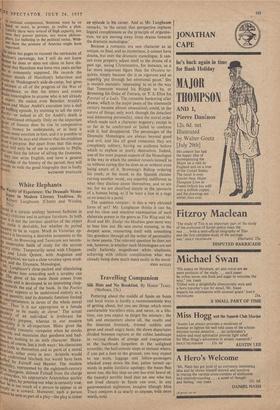White Elephants
e Poetry of Experience: The Dramatic Mono- int)gue in Modern Literary Tradition. By Robert Langbaum. (Chatto and Windus, 21s.) 1"E is a certain analogy between fashions in erarY criticism and in antique furniture. In both te ' ses it is not the intrinsic qualities of the object at make it desirable, but whether its period . t...1), sPtreeernsy i sp ets becoming a desirable possession to the cot abbel e in fields vogue. Much as 0 Victorian i ct the oe r i serious t uu up s-
,,
hieetor. so Browning and Tennyson are becom- eirarY critic. Temporarily sated with Chippen- 'e and Louis Quinze, with Augustan and etaPhysical, we turn a close scrutiny upon wool- rk and the Dramatic Monologue. Mr. Langbaum's close-packed and stimulating clk shows how rewarding such a scrutiny can The germ of his main thesis comes from er.i'l°tie and is developed in an interesting chap- towards the end of the book. In the Poetics _uaracter appears to be understood entirely as a zoral quantity, and its dramatic function limited oNaPPropriateness in terms of the whole moral rhuer. Thus 'it is not appropriate in a female pha:_,dity raeter to be manly or clever.' The actual ro
.irtstotle, of an individual is irrelevant for Be li
nsibi,. s Purpose, whereas to our modern spe tY it is all-important. Blake gives the Areifically romantic viewpoint when he mocks hestst°tle and maintains that goodness and bad- goes t.has nothing to do with character. Shake- (xi e, of course, has it both ways: his characters ggrst both in themselves and as parts of a moral h_vucture, either more or less: Aristotle would b:fne understood Macbeth but would have been genciektl: hY Falstaff and Hamlet. The modern erit7"ity, represented by the eighteenth-century Morgann, defends Falstaff from the charge 41 ttil°Wardice, his appropriate Aristotelian quality that !Play, by pointing out what is certainly true, is too much of a person to appear to us a'n_1)13/ as a coward. Moreover, such a person noot be seen as part of a play—the play is rather
an episode in his career. And as Mr. Langbaum remarks, `to the extent that perspective replaces logical completeness as the principle of organisa- tion, we are moving away from drama towards the dramatic monologue.'
Because a romantic era sees character as so unique, so final, and so mysterious, it cannot have drama, but only the dramatic monologue. It can- not even properly adjust itself to the drama of a past age, seeing Clytemnestra, for instance, as a far more important figure than the Oresteia re- quires, simply because she is so vigorous and so superbly 'put through her emotional paces.' She is ',naafis mutandis 'interesting' to us in the way that Tennyson wanted his Rizpah to be, or Browning his Duke of Ferrara, or T. S. Eliot his Portrait of a Lady. The romantic hankering after drama, wfiich in the major poets of the nineteenth century became almost obsessional, could, in the nature of things, only work through the detached and interesting personality, since the moral order which made such a character nugatory, except in so far as he conformed or failed to conform with it, had disappeared. The personages of the Dramatic Monologue are always beyond good and evil, and like all good romantics they are completely solitary, having no audience before which to explain or justify themselves. Indeed, one of the most piquant aspects of the Monologue is the way in which the speaker reveals himself to us without caring that he does so or without even being aware of it. Browning's Bishop ordering his tomb, or his monk in the Spanish cloister cursing another monk, are superbly indifferent to what they disclose about themselves; and so are we, for we are absorbed simply in the spectacle of a human being, as if he were a lion in a cage or an insect in a pond.
The question remains : is this a very elevated form of art? Mr. Langbautn thinks it can be, and his close and sensitive examination of such elaborate poems in the genre as The Ring and the Book and Mr. Sludge the Medium goes some way to bear him out. He sees moral meaning, in the deepest sense, reasserting itself with something like grandeur through all the welter of personality in these poems. The relevant question he does not ask, however, is whether such Monologues are not really forlornly magnificent white elephants, achieving with infinite complication what was already being done much more easily in the novel.
301-IN BAYLEY






























 Previous page
Previous page